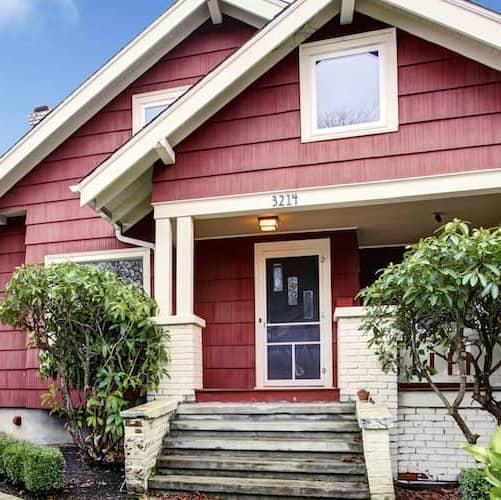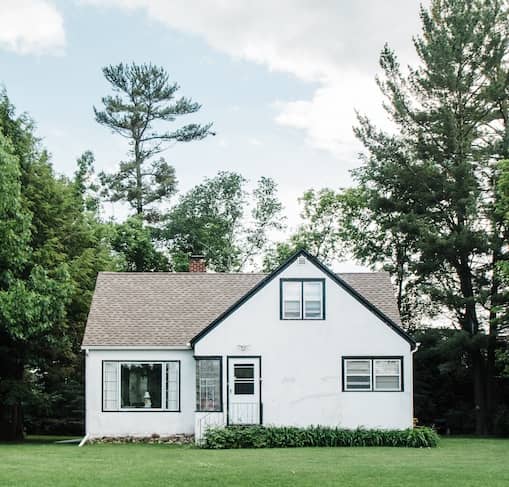What are HUD homes, and how do you buy one?
Contributed by Sarah Henseler
Sep 8, 2025
•5-minute read

As of November 16, 2025, both Fannie Mae and Freddie Mac no longer have a minimum credit score threshold in their conventional loan eligibility guidelines. Loan approval will instead be based on an evaluation of overall credit risk factors.
Imagine you’re shopping for a home on a budget, and you focus on foreclosures since they tend to sell at a discount. However, each time you make an offer, you’re outbid by an out-of-state investor flush with cash. This can be incredibly frustrating.
However, there’s a little-known category of foreclosure properties that are off-limits to investors – at least initially. They’re called HUD homes. In this article, we’ll explain what they are, how to buy them, their pros and cons, and more.
What is HUD, and how does it impact homeownership?
Before we get into what a HUD home is, let’s define HUD. It’s an acronym for the U.S. Department of Housing and Urban Development, which was created in 1965 and is now one of 15 executive departments in the U.S. President’s Cabinet.
Among other things, HUD oversees the Federal Housing Agency (FHA), which guarantees home loans issued by approved lenders. This guarantee reduces lenders’ risk, allowing them to offer more lenient loan terms. For example, borrowers can get an FHA loan with down payments as low as 3.5% and credit scores as low as 580 (or lower if you put down at least 10%).
By contrast, conventional non-government-backed mortgages require down payments of at least 20% (or lower with mortgage insurance) and credit scores of at least 620.
What is a HUD home?
A HUD home is a property that was foreclosed on due to an FHA loan default and is now being sold by HUD. It’s like a typical foreclosure owned by a bank, except in this case, the collateralized property reverts to HUD since the FHA (part of HUD) guaranteed the loan.
Unlike banks, however, HUD is a government agency with a mission to make housing more accessible and affordable. To that end, it favors offers from owner-occupants, often sets the asking price below market value, and provides different home buying assistance programs.
Who can buy HUD homes?
Anyone can buy a HUD home if they have the necessary funds or financing. However, during the initial listing period, HUD only considers offers from owner-occupants, nonprofits, and government agencies. This temporarily excludes investors, reducing competition and helping keep prices more affordable – particularly for first-time buyers.
Where do you find HUD homes?
Like most homes for sale, HUD homes are usually found on the multiple listing service (MLS). However, you can always find a full inventory list at HUDHomestore.gov. There, you can filter HUD home listings by state, city, or ZIP code. Just know that availability varies by location, and some markets may have limited or no HUD homes for sale.
How to buy a HUD home
Buying a HUD home is similar to buying any home, with some differences. Here’s how it works:
1. Explore mortgage options
First, you must secure financing to buy a HUD home. Popular options include:
- Conventional mortgage: This is the most common form of home financing, making up 78.3% of all home purchase mortgages in 2024.
- FHA loan: This is a great option if you have a low credit score or can only afford to make a small down payment.
- FHA 203(k) loan: This lets you finance the house and any repairs with one loan, making it ideal for fixer-uppers.
- Department of Veterans Affairs (VA) loan: Available to eligible veterans, active-duty service members, and surviving spouses, VA loans have no down payment requirement.
To better understand how much you can afford to spend on a HUD home, get preapproved for a mortgage from multiple lenders.
2. Find a real estate agent
A real estate agent can help you find, view, and make offers on HUD homes. However, the agent must be HUD-approved. Fortunately, many are, and you can always verify HUD approval by searching the HUD Homestore broker/agent registration list.
3. Schedule a home inspection
HUD homes may be in poor condition due to neglect or even deliberate damage caused by upset former owners. That’s why it’s important to thoroughly assess the property’s condition before making an offer. Then schedule a professional home inspection.
4. Submit a bid
Once an eligible HUD home is listed for sale, there’s an exclusive 30-day bidding period during which only owner-occupant buyers, government entities, and HUD-approved nonprofits may submit offers. To make an offer, your HUD-registered agent must submit it online, along with an earnest money deposit (usually $500 to $2,000, depending on the home’s price).
5. Close on the property
If your offer is accepted, closing on the home usually takes 30 – 60 days. This is your window to finalize your financing and get all your ducks in a row. You’ll also have a 15-day period to conduct a home inspection. After that, you can’t back out of the deal due to the inspection results without forfeiting your earnest money. The same goes for investors who bid after the initial 30-day listing period.
HUD incentive programs
On top of favoring owner-occupant buyers, HUD offers many programs to help you afford a HUD home:
Good Neighbor Next Door
The Good Neighbor Next Door program offers a 50% discount on HUD homes in designated revitalization areas to eligible law enforcement officers, teachers, firefighters, and emergency medical technicians (EMTs). However, buyers must commit to living in the property for 3 years.
Dollar program
HUD’s Dollar Homes program lets local governments (not individuals) buy HUD homes that haven’t sold for 6 months for just $1. The properties can then be renovated and used to expand affordable housing or meet other community needs.
Nonprofit program
HUD offers up to 30% discounts on HUD homes to approved nonprofits. After renovations, participating nonprofits can then sell the property to qualified low- to medium-income buyers.
Housing Choice Voucher Program (Section 8)
If you need help affording monthly mortgage payments, the Housing Choice Voucher Program (Section 8) may be a solution. It provides housing subsidies to eligible low-income individuals and families.
$100 Down program
The FHA HUD $100 Down Program lets owner-occupant buyers skip the typical 3.5% minimum down payment and put down just $100 instead. However, the program isn’t available everywhere, so check what your state offers.
Advantages of buying a HUD home
There are many benefits of buying a HUD home.
For one, HUD homes prioritize owner-occupants over investors. If you make a compelling offer within the first 30 days, you won’t have to compete against investors with deeper pockets. This tends to make HUD homes more accessible to regular homebuyers.
Plus, you can take advantage of significant discounts through HUD incentive programs. For example, if you’re an eligible police officer, teacher, firefighter, or EMT, you could save as much as 50% on the purchase price through the Good Neighbor Next Door program.
Lastly, HUD may cover up to 3% of the home’s purchase price in closing costs if you request it. On a $300,000 house, that’s $9,000! Here are some of the closing costs on a HUD home sale that may be covered:
- Prorated property taxes, homeowners association (HOA) fees, and utility bills
- Condominium or HOA transfer fee
- Cost to provide condominium documents to the buyer
- Repair escrow inspection fee of $200
- Recording fees and charges for the deed
- Overnight mailing fee for the closing disclosure
- State and local transfer taxes
Drawbacks to buying a HUD home
Of course, buying a HUD home also comes with some potential drawbacks.
For instance, HUD homes are sold as is, meaning the buyer is responsible for any needed repairs. To know what you’re up against, thoroughly assess the home's condition before closing.
If you buy a distressed HUD home, you must then hire contractors or personally put in the work to correct any code violations and make it livable again.
Finally, you must commit to living in a HUD home for at least 1 year and cannot buy another HUD home for 2 years, limiting your home purchase options.
The bottom line: HUD homes can offer an affordable path to homeownership
While HUD homes come with some downsides, they can also be an affordable path to owning a home. With special buyer programs and less competition from investors, HUD houses may open the door to homes you otherwise couldn’t afford.
If you’re ready to explore this opportunity, Rocket Mortgage® can help you secure the right financing for your needs. Take the first step toward your new home by applying for a loan today.
Rocket Mortgage is a VA-approved lender, not endorsed or sponsored by the Dept. of Veterans Affairs or any government agency.

Christian Allred
Christian Allred is a freelance writer whose work focuses on homeownership and real estate investing. Besides Rocket Mortgage, he’s written for brands like PropStream, CRE Daily, Propmodo, PropertyOnion, AIM Group, Vista Point Advisors, and more.
Related resources
7-minute read
Buying a house with low income: Loan options, assistance programs, and tips
Becoming a homeowner is still possible with a low income. See what low-income house buying programs and strategies can help when applying for a mortgage.
Read more

10-minute read
Learn about investing in real estate owned (REO) property
Real estate owned (REO) properties are often overlooked investment opportunities. Learn why buying a home from a lender may be the right strategy for you.
Read more

7-minute read
USDA vs. FHA Loans: Which is better for you?
USDA and FHA loans can offer more lenient requirements for home buyers with low or moderate income. Learn what else these loans can offer and how they differ...
Read more